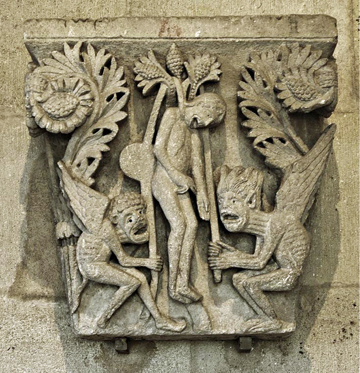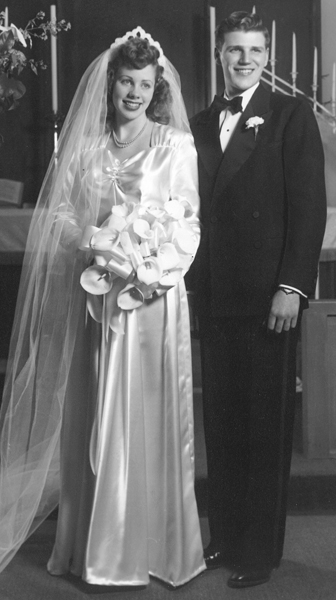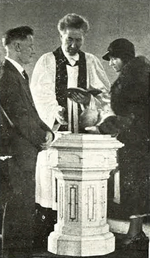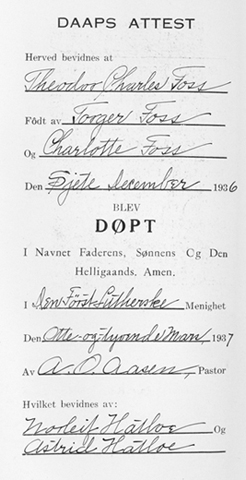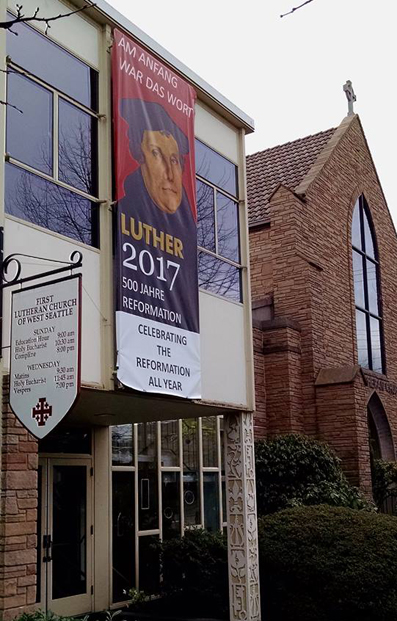March 2017
|
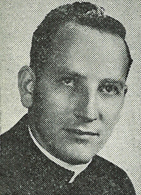
Don’t You Want to be a Prominent Man?
When Paul Braafladt was in the Spring term of his senior
year at PLU in Tacoma (1951), he had a strange experience
walking home one day. All of a sudden – with no one around
to witness it – he burst into tears, sobbing uncontrollably.
This had never happened to him before. At that moment Paul
knew he should change his plans and go to the seminary
instead of medical school at the University of Washington.
(And as it turned out, Paul was ordained in 1956 and served
for over thirty-five years in the ministry of the Lutheran
church and ready reserve chaplaincy of the US Air Force.)
He already had fulfilled all the requirements for graduating
in biology and chemistry. Many of his classmates were
heading to medical school at the UW with him. But now, in a
moment, all that changed. What he had been suppressing for a
long time, took over. He knew he had to go to the seminary
to see if being a pastor was the right thing for him to do.
Paul also knew he had to tell his mother about this right
away. Paul’s older brother, Halvor, already had become a
physician, like their father, and his mother was expecting
another doctor in the family. When Paul told her, she
couldn’t believe her ears. So she asked her step-daughter,
Borghild, to ask her physician husband, Tom, to talk to Paul
(who was one of his favorites). What he had to say to Paul
was: “Don’t you want to be a prominent man?” The message was
that if Paul gave up on medicine and entered the Christian
ministry instead, he would be wasting his life and talents.
[as told by Paul to a group of Lutheran pastors in Seattle
on February 2,2017
– Pastor Marshall] |
|
Chuck & Doris Prescott
70th Wedding Anniversary
Congratulations to Chuck & Doris!
They have been members here since
March of 1954 (Doris being Parish
Secretary from 1973-87).
They were
married at University Lutheran Church
in Seattle on January 22, 1947.
Blessings on your wonderful life together! |
Ted Foss
80th Anniversary of Baptism
March 28, 2017
The above certificate is in Norwegian and is signed by Pastor A.
O. Aasen, who is also pictured above.
Congratulations Ted! We thank God that you
have been a member here all of your life.
|
President’s Report…by
Bob Baker
At the congregation’s annual meeting Jan. 29th, new Congregation
Council members were elected: Peter Douglass, Cary Natiello and
Jamey Sagmoen. Bob Baker, Earl Nelson and Bridget Sagmoen were
re-elected to new terms. Thank you and congratulations! We thank
our outgoing members, Janine Douglass and Dale Korsmo for their
considerable service.
At the first meeting of the new Council, Committee memberships
were agreed upon:
Comm. For Parish Ministry: Bridget Sagmoen, Chair; Pastor
Marshall and Bob Baker.
Comm. For Extended Ministry: Carol Nelson, Chair; Jane Harty and
Jamey Sagmoen.
Comm. For Education: Peter Douglass, Chair; Gina Allen.
Comm. For Facilities: Jeff Sagmoen, Chair; Dean Hard.
Comm. For Budget and Finance: David King, Chair; Melanie
Johnson, Janice Lundbeck and Cary Natiello.
Committees meet from 7:30 to 8:00. FLCWS members are invited,
urged even, to meet during this committee time without having to
meet for the rest of the Council meeting! Facilities is
especially in need of additional help.
Two Motions were made during New Business:
It was Moved to establish a Committee for the 100th Anniversary
of First Lutheran Church of West Seattle, with Pastor Marshall
designated as the Chair. Motion passed unanimously. This
committee is responsible for all planning regarding the
September 23, 2018, celebration of our 100th Anniversary, as
well as possible additional events on All Saints Sunday,
November 4, 2018. The motion passed unanimously.
It was Moved to authorize purchase and display of a 500th
Anniversary of the Reformation banner to be paid for by special
donations only, and to be displayed outside the front of the
church building all of 2017 except during Easter and Christmas.
Afterwards it may be displayed inside permanently. The banner is
to be made of durable canvas measuring 12 feet three and
one-half inches by seven and one-half feet. The image will look
like the upper left-hand corner of the bulletin we are using
every Sunday this calendar year. The motion passed unanimously.
A verbal decision was agreed upon for the Facilities and Budget
& Finance committees to jointly work on inventorying the
congregation’s assets, determine replacement costs, and with
that information review our current insurance coverage, and
possibly compare cost of appropriate policy with different
insurance companies. This joint committee project will report
their progress in May or June.
The Facility Committee also agreed to report back in May on
progress with getting bids for repair/replacement of east facing
glass wall by the lounge stairway. 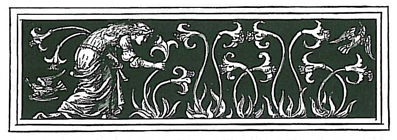 |
Stewardship
_________________________________________________
Creation and Romans 8:18-23
I always wonder what the second offering prayer in the liturgy
means when we say that we “dedicate our lives to the care and
redemption of all that you have made.”
The prayer finishes with “for the sake of him who gave
himself for us, Jesus Christ our Lord.”
It seems a tall order, since God made the entire universe and
everything in it.
Can it be that just as Creation fell when Adam and Eve fell, so
all of Creation will be lifted up when we are finally remade
when Christ returns?
Paul says exactly that in Romans 8.18-23, that “the
Creation was subjected to futility” but will be “set free from
its bondage to decay and obtain the glorious liberty of the
children of God.”
We live in a time of environmentalism and—a term I personally
prefer—conservationism, that is, of human ideology based
primarily in rational self-interest.
It has been accompanied by narratives of dystopia and
utopia, disaster and earthly bliss, the alternative outcomes
based on human choice and initiative.
It is tempting to find common ground between such
narratives and biblical eschatology, but it seems to me that the
two actually have little in common.
In the same verse Paul says that “the creation was
subjected to futility, not of its own will but by the will of
him who subjected it in hope.”
Paul apparently refers to Genesis 3, and the regime of
enmity, consequence of the Fall, which God established then
between nature and humans.
According to this word, it is not in our power in this
life to restore our relationship with nature.
Rather it is up to God.
Note also that nature groans not for anything it did wrong, but
because of our sin.
We are meant to feel sharply this enmity between ourselves and
the creation, and regret it.
We did not at first eat animals.
As Paul puts it, the way back is not back but forward.
Our enmity with nature is on account of our original and
hereditary sin, our turning away from God.
In order for nature not to “groan,” we have to stop
sinning, and we sin with respect to God, not with respect to
nature, as many environmentalists would have it, though nature
also pays a price on our account.
If I have lined these things up correctly, I can now
conclude that the best thing I can do for nature is to steward
my church, which is the way to increase that “hope” to which
Paul referred, the hope of salvation in Christ Jesus.
The creation waits on us and our relationship to God,
which it is up to God finally and forever to fix.
Besides this narrative of salvation that includes physical
nature, there is the matter of rational self-interest.
A biologist friend of mine, an atheist and a passionate
environmentalist, set great store by it.
It was his great hope for the success of the movement he
worked more or less constantly to foster.
To me, who love birds and plants in my own way fully as
much as he did, human rational self-interest seems an extremely
weak reed on which to rest hope.
I, on the other hand, believing in unseen things, can
hope in the God for whom creation with all its strange beauty
both in the parts and the whole is merely a footstool, and in
His son, whose loving sacrifice on our account causes us to look
beyond ourselves.
─Earl Nelson, Church Council |
John 9:39
That Those Who See May Become
Blind
strangely after leaving his car. Their
suspicions were heightened when he flung them off his back as
they tried to handcuff him, which also made them aware of
King's strength. King’s amazing
ability to shake off the effects of the two 50,000-volt volleys
from Koon’s stun gun was the clincher. None of the officers who made contact with
King – Powell, Wind, Briseno, and Roland Solano – had ever seen
anything like that. Later speculation that the stun gun’s
electric darts had not made proper contact did not occur to any
officer at the time…. The action that occurred before the
videotape began is the fundamental reason that the video cannot
be relied upon for an understanding of what happened to Rodney
King. The events that were not video-taped after King stopped
his car took at least five or six minutes…. The other problem
with the videotape is its perspective. To viewers of the video,
the beating of King seems callous as well as brutal because
officers can be seen watching with folded arms, as if they have
no cares in the world. But Koon could not see those officers. He
stood within a cone of light that shone downward from the police
helicopter, his gaze fixed on King and Powell.”
[Lou Cannon,
Official Negligence: How
Rodney King and the Riots Changed Los Angeles and the LAPD
(Boulder, Colorado: Westview,
1999) pp. 578–79, 80.] |
Book of
. . . What?
Why?!...by
Bob Baker
Why? Yes, why does the Pastor take time each month at the
Congregation Council meeting to lead a discussion on some
section of The Book of
Concord? Nobody wants the meetings to run any longer than
necessary! Right? “You know I’m right.” So why do it?
I’m glad you asked!
Let’s consider this. Talk with someone about their thoughts
about the Bible, and chances are you will soon learn much more
about that person’s feelings, that person’s wants, and popular
preferences—much more about them than you will learn about the
Bible. It will mostly, if not all, be about what they read
into the Bible rather
than what the Bible has to say
to them. Now that’s
really not surprising. Isn’t that usually the case, regardless
of the topic? I guess alternative “facts” are nothing new.
OK, you say. But What about
The Book of Concord?
Thanks for keeping me on track. The way I see it—yes, this tells
you something about me—one way of thinking about the Reformation
in this its 500th Anniversary year is that the Reformation came
about because so many people agreed that in Martin Luther’s
teaching, they found they were learning more about the Word of
God in the Bible addressing them than they were learning about
Martin Luther. Not that we don’t learn anything about Martin
Luther himself. But in his day, church practices had departed so
far from the biblical message
to the people of God
that someone like Luther was needed to get people back to what
the Bible had to say about sin, God’s wrath, and salvation
through the redemptive death of Jesus.
Ah, but Luther died February 18, 1546. Obviously after that, he
himself was no longer teaching. Years began to pass. People who
valued what Luther taught about the Word of God wanted to
preserve the essence of his teaching and position statements on
biblical teaching.
How might they do that? Good question. In short, let us say that
in 1580, the leaders of the churches, following the teachings of
Martin Luther, collected the historic documents commonly
acknowledged as the standards of the Lutheran Movement. These
documents were regarded as essential to preserving the faithful
teachings about the biblical Word of God. Much of it was written
by Luther himself, and by Philip Melanchthon his right-hand
collaborator. Collectively these documents constitute
The Book of Concord; The
Confessions of the Evangelical Lutheran Church, first
published in 1580. In that book, Martin Luther is regarded as
“our most eminent teacher.”
Now back to your original question: Why
The Book of Concord
at Council meetings? Pastor Marshall helps keep the elected
leaders of this congregation tethered to
The Book of Concord,
which helps keep us tethered to what the Bible says we should be
about. I thank God for that! It is an urgently needed practice.
However, in my experience it is not a practice advocated by our
seminaries. Much of their comments about the biblical message
tell us more about the current content of popular culture than
they tell us about the Word of God speaking
to us.
So I urge Pastor Marshall to continue leading us through
The Book of Concord,
and continue to urge us to be as conversant about what Scripture
and The Book of Concord
have so say to us as
we are about the NFL, the NBA, or the latest Microsoft or Apple
product! |
March Book
With the Mind:
Readings in Contemporary Theology
3-5 pm in the Church Lounge, Saturday, March 25th.
The book for March is The
Allure of Gentleness: Defending the Faith in the Manner of Jesus
(2016) by Dallas Willard (1935–2013), long time professor at
University of Southern California. This book is a detailed
elaboration of the defending of the faith with gentleness in 1
Peter 3: 15–16. He argues that you can mount the best defenses
of the faith but they will fail if they do not include
gentleness (p. 5)
A copy of this wonderful book is in the library. If you would
like to purchase one for yourself, contact Pastor Marshall. Feel
free to attend our meeting when we discuss the right way to back
up the faith.
ANNOUNCEMENTS:
WEB PAGE ADDRESS:
www.flcws.org Log
on to see what is new! Besides the monthly update of the latest
issue of The Messenger,
each week we have the “bulletin of the week” added to the 500
Year Reformation bulletin page.
Also listed you can find Bible Study helps, upcoming
events and photo updates.
Each page is unique in what it has to offer.
.
|
Monthly Home Bible Study, March
2017, Number 289
The Reverend Ronald F. Marshall
Along with our other regular study of Scripture, let us join as
a congregation in this home study. We will
study alone then talk
informally about the assigned verses together as we have
opportunity. In this way we can "gather
together around the
Word" even though physically we will not be getting together
(Acts 13.44). (This study uses the RSV translation.)
We need to support each other in this difficult project. In 1851
Kierkegaard wrote that the Bible is "an extremely dangerous
book.... [because] it is an imperious book... – it takes the
whole man and may suddenly and radically change... life on a
prodigious scale" (For
Self-Examination). And in 1967 Thomas Merton wrote that "we
all instinctively know that it is dangerous to become involved
in the Bible" (Opening
the Bible). Indeed this word "kills" us (Hosea 6.5) because
we are "a rebellious people" (Isaiah 30.9)! As Lutherans,
however, we are still to "abide in the womb of the Word" (Luther's
Works 17.93) by constantly "ruminating on the Word" (LW
30.219) so that we may "become like the Word" (LW
29.155) by thinking "in the way Scripture does" (LW
25.261). Before you study, then, pray: "Blessed Lord, who caused
all holy Scriptures to be written for our learning: Grant us so
to hear them, read, mark, learn, and inwardly digest them, that
we may embrace and ever hold fast the blessed hope of
everlasting life, which you have given us in Our Savior Jesus
Christ. Amen" (quoted in R. F. Marshall,
Making A New World: How
Lutherans Read the Bible, 2003, p. 12). And don’t give up,
for as Luther said, we “have in Scripture enough to study for
all eternity” (LW
75:422)!
Week I.
Read Romans 11.24 noting the word
wild. What makes this
tree wild? On this read Isaiah 5.2 noting the contrast between
the two words choice
and wild. What makes
the vine wild and unruly if it was so good when planted? On this
read Isaiah 5.20 noting the line
woe to those who… put
bitter for sweet and sweet for bitter. What’s involved in
this mix-up? On this read Isaiah 3.8 noting the words
fallen,
against and
defying. Why would we
oppose God like this and ruin these choice vines? On this read
Isaiah 1.19–20 noting the words
refuse and
rebel. But why are we
so disobedient when it isn’t in our self-interest? Why do we
willingly hurt ourselves? On this read Isaiah 1.6 noting the
line there is no
soundness. What happens when that’s the case? On this read
Isaiah 59.2 noting the line
your iniquities have made a separation between you and your God.
What follows when that happens? On this read Isaiah 30.1 noting
the phrase they… add sin
to sin. Where does that lead? On this read Isaiah 30.11
noting the line let us
hear no more of the Holy One of Israel. Where does that
leave us? On this read Isaiah 30.12–14 noting the phrase
smashed so ruthlessly.
Do you understand your wildness a little better now? If so, how
so? Is it that we have given up on
consulting the Lord –
following in the path of Isaiah 31.1?
Week II.
Read again Romans 11.24 noting the phrase
cultivated olive tree.
What is this tree? On this read Romans 11.5 noting the line
a remnant, chosen by
grace. Read also Romans 2.28–29, noting the words
real,
true,
outwardly and
inwardly. So the
cultivated tree is the true community of God. On this read
Galatians 6.14–16 noting how
crucifixion and
walking by that
rule brings about a
new
creation, the real
Israel
of
God. Where do we find
this community? On this read Acts 20.7 noting the words
first day of the week
and bread. What does
this new Sabbath indicate? On this read Hebrews 9.15 noting the
words mediator,
new,
death and
redeems. And why is
this important? On this read Hebrews 8.13 noting the words
first,
obsolete and
vanish. Does this
explain the joy in
Philippians 4.4? How so?
Week III.
Reread Romans 11.24 noting the words
grafted and
against. Is this how
we enter into to this new covenant – this new community of God?
On this read John 6.44 noting the word
draw. How disruptive
is this to us? On this read Luke 16.16 noting the word
violently. Why does
this have to be? On this read John 3.19 noting the words
loved,
darkness and
rather. What does
this distorted love do to us? On this read Ephesians 2.3 noting
the words nature and
wrath. What are the
consequences of this corruption to our very nature? On this read
John 15.16 noting the contrast between the words
choose and
chose. What does that
imply? On this read Romans 9.16 noting the line
it depends not upon man’s
will or exertion. Why not? On this read Romans 7.18 noting
the words nothing,
good and
cannot. How impaired
do all of the verses leave us? On this read Revelation 3.17
noting the words wretched,
pitiable,
poor,
blind, and
naked. If that’s so,
what’s left in us? On this read Mark 7.21–22 noting the words
evil
thoughts,
fornication,
theft,
murder,
adultery,
coveting,
wickedness,
deceit,
licentiousness,
envy,
slander,
pride and
foolishness. Where
does that leave us? Romans 7.24 says
body of death. Do you
agree? If so, why?
Week IV.
Read Romans 11.24 one last time noting the word
cut. Is this violent
word gracious since it gets the ball of salvation rolling? On
this read Acts 9.3–9 noting the contrasting words
flashed and
fell, with
led and
brought. Is this an
example of a violent beginning with a peaceful ending? On this
matter of proper sequence, read Romans 2.4 noting the words
kindness,
lead and
repentance. Here the
order is reversed, and it fails. Know why? On this read 2
Corinthians 6.1 noting the words
entreat,
not,
grace and
vain. So is it that
we presume on the
kindness of God as Romans 2.4 puts it? Do we misuse mercy and
grace and thereby force upon ourselves a harder road? On this
read Matthew 7.14 noting the words
narrow and
hard. Where does that
leave us? On this read the Hebrews 11.32–40 with its vast array
of difficulties and horrors. |
|
|
Library News…
Step into our library and you may notice a few changes. In
commemoration of the 500th anniversary of The Reformation, you
may be interested in reading and learning more about Martin
Luther and our Lutheran heritage and faith. To aid you in
finding books and media on this subject, the bookcase facing you
at the end of the table as you enter the library has been
emptied and dedicated to all things Luther and Lutheran. If you
would like to search for anything you don’t see there, just sit
down at the computer and press any key and the search screen,
similar to the one at your public library, will appear. You may
search by author, title or subject to see what our library holds
to satisfy your search.
On the
bookcase at the right of the computer I have labeled a space for
NEW BOOKS and CDs. To check out any of these or other items, we
still use the “old fashioned” book pocket with sign-out card
system. However, other than that, our library database is
completely computerized and using the computer search screen
mentioned above is the way to find what you are looking for. The
old wooden card catalog has not been kept up to date for many
years now and will soon be removed from the library.
Other
changes for our library are in progress. As time marches on,
certain forms of media, namely audio and video cassette tapes
and filmstrips have become obsolete. Space is at a premium and
circulation of these items has gone down to nothing in recent
years. These forms of media are being removed from our computer
database and from the library shelves. For the time being they
will be boxed up and kept until discussion and a decision is
made concerning their disposal.
|
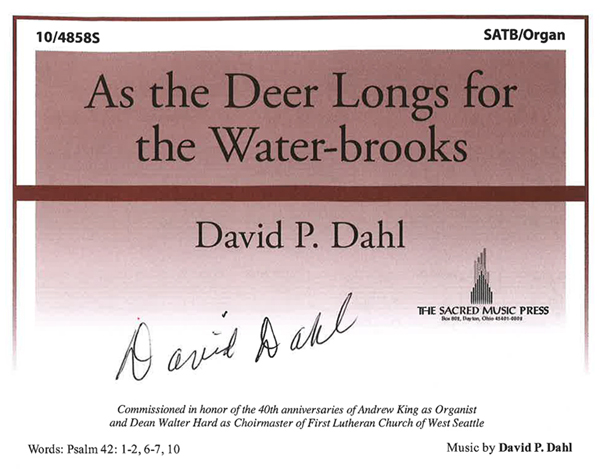
Commissioned Anthem Published
In 2015 First Lutheran Church of West Seattle commissioned a new
choral anthem to honor the 40th anniversaries of Andrew King as
organist and Dean Walter Hard as choirmaster of our church.
The anthem by David P. Dahl, Professor of Music and
University Organist Emeritus at Pacific Lutheran University, was
premiered at the 40th anniversary liturgy on Sunday, September
27, 2015, with the composer in attendance.
Based on Psalm 42, the anthem was published this year by
The Sacred Music Press of Dayton, Ohio, with the title
As the Deer Longs for the
Water-brooks.
It was originally written with the traditional text
Like as the Hart Longs
for the Water-brooks, including the newer rendering of the
published title as an alternate text.
The published version reverses the two, including the
traditional text as the alternate.
We’re delighted that this beautiful and moving anthem has
now been made available to choirs everywhere.
|
Remember in prayer before God those whom He has made your
brothers and sisters through baptism.
Dean Walter Hard, Marlis Ormiston, Ken Sund, Mariann Petersen,
Evelyn Coy, Eileen Nestoss, Tabitha Anderson, Leah Baker, Bob &
Barbara Schorn, Celia Balderston, The PLU Music Faculty, Heidi
Anderson, Jordan Corbin, Jim Moe, Matt Anderson, Linda Anderson,
Margeen & Chris Boyer, Linda Hagen, Iris Hansen Tate, Nell &
Paul Sponheim, Stan & Doreen Phillips, The Rev. Kari Reiten, The
Rev. Keith Krebs, The Rev. Paul Smith, Laura Coy, John
Matthiesen, Therese Mannella, Ion & Galina Ceaicovschi, Nathan
Arkle, Kevin & Jacqueline Johnson, Chris & Margeen Boyer, Merle
& Irene Machmiller, Myra Woody, the Alaska House in West
Seattle, those infants and families affected by the Zika virus,
the great migration from the Near East into Europe and other
parts of the world.
Pray for the shut-ins that the light of Christ may give them
joy: Florence Jenkins, C. J. Christian, Louis Koser, Anelma
Meeks, Dorothy Ryder, Lillian Schneider, Crystal Tudor, Nora
Vanhala, Elmer & June Wittman, Bill Wright.
Pray for our bishops Elizabeth Eaton and Brian Kirby Unti, our
pastor Ronald Marshall, our deacon Dean Hard and our cantor
Andrew King, that they may be strengthened in faith, love and
the holy office to which they have been called.
Pray that God would give us hearts which find joy in service and
in celebration of Stewardship.
Pray that God would work within you to become a good
steward of your time, your talents and finances.
Pray to strengthen the Stewardship of our congregation in
these same ways.
Pray for the hungry, ignored, abused, and homeless this Lent.
Pray for the mercy of God for these people, and for all
in Christ's church to see and help those who are in distress.
Pray for our sister congregation
El Camino de Emmaus,
in the Skagit Valley, that God may bless and strengthen their
ministry. Also,
pray for our parish and it's ministry.
Pray that God will bless you through the lives of the saints:
Thomas Aquinas, teacher, 1274; Joseph, guardian of our
Lord.
|
Give Thanks Always
-------------------------------------------------------------------------------------------------------
Singing 1 Thessalonians 5:18
By Pastor Marshall
Try singing this repeatedly as a round during the day – to
yourself or out loud – as you do your work or when you’re
sitting around. Use the beginning of the tune “The Ash Grove” (Lutheran
Book of Worship,
1978, Hymns 221, 557). Maybe it can help you increase your
thanksgiving….
Thank you for
my safety,
my faith;
and that I’m healthy,
and wealthy;
and for my family,
and the work that I do.
(RFM, February 20, 2017)
Feel free to change the words if you like—but include the six
categories.
Included in faith are Christ, suffering
and his church.
Included with family are friends—and
the you is, of course, our heavenly Father.
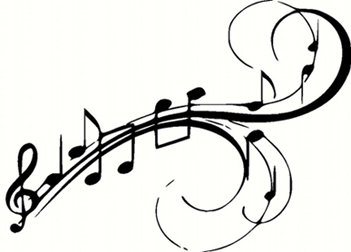 |
